The Bedfordshire Regiment in the Great War

'Other Ranks' Photographs and Biographies from the Herts Regiment
Private 1558 Alfred William PLUMB
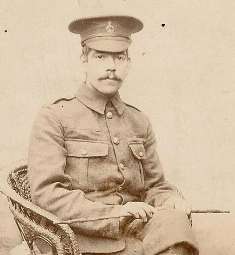 Alfred
Plumb was born in Colliers End, near Ware in Hertfordshire in September
1891.
Alfred
Plumb was born in Colliers End, near Ware in Hertfordshire in September
1891.
He was a nineteen year old 'House Boy' when he enlisted into the Hertfordshire Regiment at Braughing on the 20th September 1910, having served in the 1st Volunteer Battalion of the Bedfordshire Regiment beforehand. His father had already passed on and his mother, Mary, lived in Colliers End.
Alfred attended the regiment's annual training at Thetford in August 1911 and Worthing in August 1912 and was amongst the part time, Territorial Army soldiers of the Regiment who signed up for foreign service when war was declared in August 1914. Private Plumb became an 'Old Contemptible' when he went abroad with the battalion when they were mobilised, landing on French soil 6th November 1914. However, he was back in England on the 4th December 1914 and remained in Blighty recovering from either illness or wounds until the 24th June 1915.
After a further three months in the front lines, Alfred returned home to England again on completion of his period of engagement in the army and was discharged completely on the 28th September 1915.
It appears that Alfred did not return to the front lines again, unless serving under a different regiment entirely, but was likely to have served in another capacity on the home front. He married Emily at High Cross church, Hertfordshire on the 4th December 1915 and they had a son Alfred in October 1916.
Although Alfred survvied the war sadly his younger brother, Charles Henry Plumb, died on the 8th December 1917 whilst serving in the 2nd/6th South Staffordshire Regiment. He was just 20 years old and lies in the Etaples military cemetery.
Alfred died 31st May 1969 at his home in High Cross and is buried in the local churchyard, where Arthur Martin-Leake, who was the first of just three men to be awarded two Victoria Crosses, is also buried. Below are Alfred and Emily Plumb around 1968, not long before his death, his medals which are still with the family today, as well as the Christmas 1914 tin presented to those soldiers on the front lines during the first Christmas.
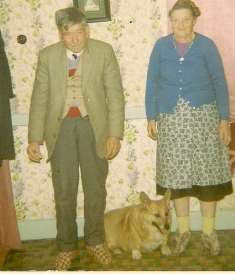 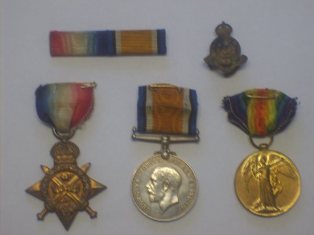 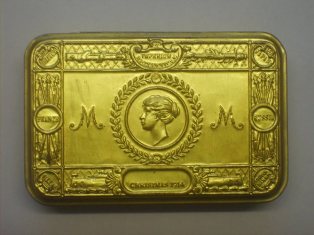 |
[With thanks to James Dagwell who is Alfred and Emily's Great Grandson for the photographs]
Privates 5584 Harry King and 5998 David King
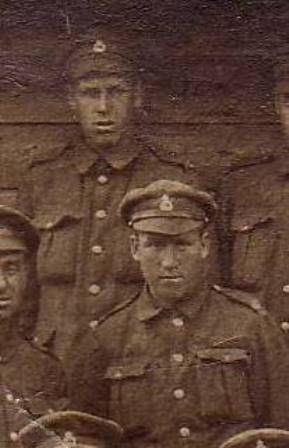
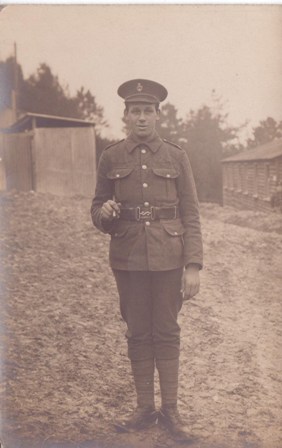
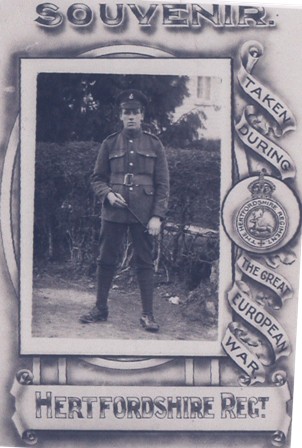
Left to right; David (front) and Harry (back), cropped from their platoon photograph of 3 June 1917. Harry middle and right photos.
Harry and David were brothers from a family of famous canal boatmen from Apsley in Hertfordshire. They both enlisted at the time of the Derby Scheme, around December 1915 / January 1916, both being employed for Dickinson's at Apsley Mill at the time.
After training, both brothers would have joined the 1st Hertfordshires in the field over the summer / autumn of 1916 and would have been engaged in the final phase of the Battles of the Somme (1916), notably the Battle of the Ancre in November. At the end of November, the battalion moved into the Ypres salient where they would remain until engaged in their fateful assault 31 July 1917, David and Harry enduring the resulting trench warfare for eight months.
Whilst in reserve at Wormhout on 3 June 1917 the battalion had a series of platoon photographs taken, with Harry and David's No.7 Platoon from No.2 Company being shown here. These were to prove to be the last photographs taken of many of the men.
Their battalion attacked German positions during the opening day of the Third Battle of Ypres (Passchendaele), with no officers and only around 130 men coming back from the attack. Both brothers were among the 460 casualties, with Harry being wounded and his brother David being posted as missing in action.
In the aftermath of their assault and despite them being used to heavy losses after three years of warfare, the county was shocked, with obituaries, pleas for information on missing sons or husbands and poetry filling newspapers county-wide. One such entry from an unknown county paper recorded a hymn reportedly sung about the battalion's attack:
Listen to the story that I wish to tell, Of the lads of Hertshire whom you know so well.
Loyal lads of Apsley, Hempstead and Boxmoor, Loyal lads of Langley, many a gallant score.
Over there in Flanders on a winter's night, When the rain was falling and the roads a sight,
Loudly rang the bugle for the Hertshire men, Who with joy assembled, ne'er to meet again.
In the rain and darkness, to the foe draw near, Softly take the places of your brethren dear,
Bravely they have battled, many a weary day, Forward to relieve them! Forward to the fray!
Ready, ever ready, are the Hertshire men, Though it were to battle, every man with ten,
With a cheer they started for the battle front, Started for the trenches, there to bear the brunt.
Through the rain and darkness, gallantly they went, Till they reached the quarters of their Regiment.
Like the roar of thunder sounded every gun, Fell each shell around them, like a bursting sun.
Onward to the trenches, silently they sped, Leaving now behind them wounded ones and dead.
Clouds were black above them, troubled seemed the moon, At the front in Flanders, where death comes soon.
Weary British soldiers, sodden through with rain, Singing "Tipperary", leave the trench again.
And the men of Hertshire take their place tonight, Where the shells are screaming, 'Mid the winter's blight.
But amid the rattle of the cannonade, From the flooded trenches, where the Hertshires wade.
Hear the voice of music falling on the ear, 'Tis the men of Hertshire singing strong and clear:
"Jesu, lover of my soul, let me to Thy bosom fly, While the nearer water roll, while the tempest still is high.
Hide me, O my Saviour, hide. 'Till the storm of life be past! Safe into the haven guide, O receive my soul at last!"
Sunday schools of Hertshire, now so far away. Taught to them the music of that noble lay.
And amid the battle, echoes reach their ears Of the children singing,
[and the last line is, annoyingly, missing!]
Harry recovered from his wounds but was only fit enough to serve in the Royal Defence Corps, which he joined some time in 1918.
No further news of David's fate was learned so his death was presumed in October 1918. David's final resting place was never found and he is remembered on the Ypres (Menin Gate) Memorial to the missing (below).
From the Hemel Gazette, 1 December 1917
The brothers' family were left in possession of several other photographs from their time in the Hertfordshires, presumably during training in 1916, or whilst in reserve around Ypres in 1917. They can also be seen here, along with the platoon photograph from June 1917.
(With thanks to Chris Jones, descendant of the brothers, for the photographs and biographical information)
Site built by Steven Fuller, 2003 to 2023